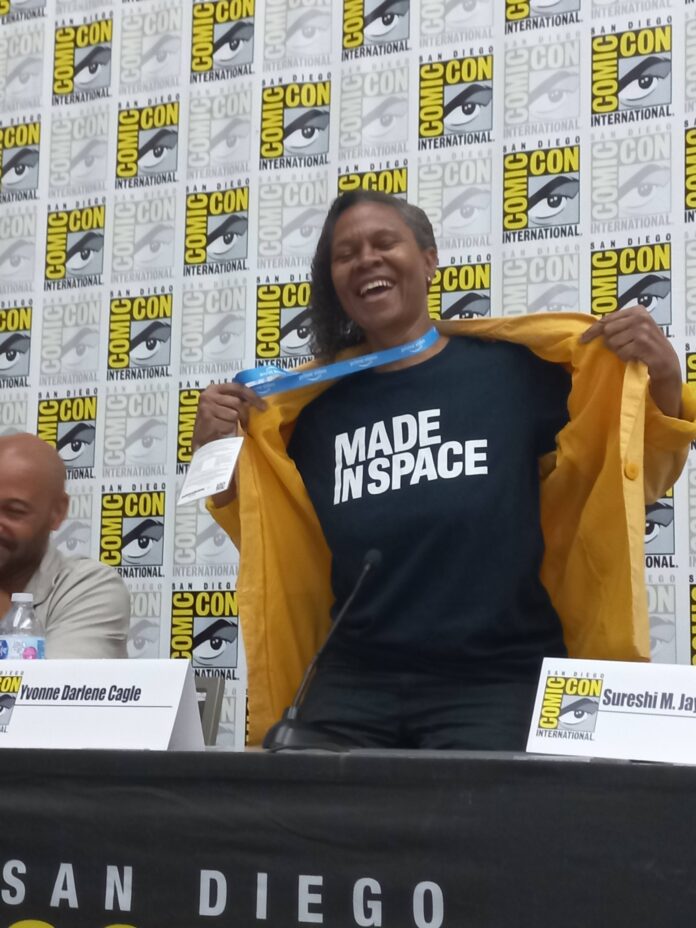
By Cori Zaragoza, V&V Staff Writer
The COVID-19 pandemic halted many things — and San Diego Comic-Con (SDCC), the annual convention and meeting place for fans and professionals in pop culture and the media to come together, was one of the first events of 2020 to be postponed. After the event was postponed again in 2021, fans began to wonder, would SDCC ever return in person?
The answer finally came last week, when SDCC returned to the San Diego Convention Center from July 20 to July 24. For four days, over 130,000 nerds and San Diegans of every kind descended on Downtown San Diego. Outside the convention center, flocks of people walked the streets of the Gaslamp district, whether they had Comic-Con tickets or not. .
On the exhibit floor, hundreds of Black cosplayers posed for attendees in a variety of characters. Seen in specific were a troupe of characters from Batman, all Black teenagers, in a ‘punk’ or ‘rocker’ version of those characters. Seen on the ‘punk’ Catwoman, was a batman patch with an “X” scribbled over his face, showing the amount of detail that these cosplayers put into their costumes. One superhero seen outside the Convention Center dubbed himself, “The Black Man.” His secret weapon? An afro-pick. Another popular cosplay was from the world of Wakanda, with many dressing up as warriors from the Marvel movie Black Panther. The trailer for the next installment in this franchise, Black Panther 2: Wakanda Forever, was released exclusively at Comic-Con on Saturday, July 23. The trailer is now online and can be accessed on Youtube, and the movie will premiere in November of this year.
Held every year is the “Afro-Futurism–Black to the Future” panel, with the title, “No Jive–Talk Black to Me!”. It featured a panel of women who spoke about new technologies, the consequences of racism on these technologies, and how they affect the Pan-African diaspora. The panel featured Astronaut Dr. Yvonne Darlene Cagle, M.D., associate professor of Africana studies at San Diego State University; Dr. Sureshi M. Jayawardene, Ph.D.; and Dr. Lauren Thomas Quigley, Ph.D., who is a technology curriculum specialist and is a part of HackTheHood.Org.
Dr. Cagle, one of six Black women who have had the unique distinction of having traveled to space, lauded the future of technologies, and how we can use them for space exploration, and what she has learned from her trips beyond the earth’s atmosphere. She praised the human body, explaining how versatile we can become when pursuing space exploration.
“You are amazing. It has been less than 8 minutes and 31 seconds, and you’re already 250 miles above the Earth, going 17,500 miles per hour on your way to Mach 25. Physiologically, you have effectively already run the equivalent of no less than six 25K marathons. And your DNA is already re-coding you — your mind, body, soul, and epigenetics. From that person you may never be again, you will go to become, possibly, that very extraterrestrial we go in search of. That is awesome,” she said with a smile, describing what it felt like to travel in space.
Dr. Quigley went on to explain the background of artificial intelligence (A.I.) and how it is already biased due to being made by mainly white creators, and that Black engineers will be the answer to making sure that our future A.I. is not racist. Outside the Convention Center, Dr. LaWana Richmond held the Afrofuturism Lounge at the Quartyard. To read more on that event, see page 9.
Across the convention center, another panel was taking place with the writers of the novel Blackout. The novel, written by five Black female authors, is a story of intertwined Black love and chance meetings, all taking place during a blackout. The book has been picked up by the Obamas’ production company, Higher Ground, and will be developed by Netflix. The authors are Ashley Woodfolk, Nicola Yoon, Nic Stone, Tiffany D. Jackson, and Dhonielle Clayton, and they are each acclaimed and accomplished in their own right. Together, they “created something magical,” according to Nicola Yoon.
“We are all motivated by the same mission,” said author Nic Stone. “And that is to tell stories with people who look like us.”
This sentiment is reflected in casting choices for upcoming shows, such as Anne Rice’s Interview With The Vampire, where two main characters for traditionally white roles were given to Black actors. In the role of Claudia, African American actress, Bailey Bass, was cast, and for the titular character of the vampire, Louis, actor Jacob Anderson won the role.
Additionally, in Neil Gaiman’s The Sandman, which is being adapted for television, Kirby Howell-Baptiste was cast in the coveted role of Death, which caused some controversy as she is Black and the character is traditionally a very pale white. Nonetheless, Neil Gaiman has come out in support of the casting choice and the show is set to premiere at the end of this month.
“I loved Death when I first read the comic, but never could’ve imagined playing the character,” Ms. Howell-Baptiste exclaimed during a panel for the show.
At SDCC, all things are possible, and the support of fans keeps the pop culture and literary scene alive. After years of living in a pandemic, the attendees finally got everything they asked for: a weekend in beautiful San Diego, surrounded by like-minded people, in celebration of creativity with some escapism thrown in. Who could ask for more?


